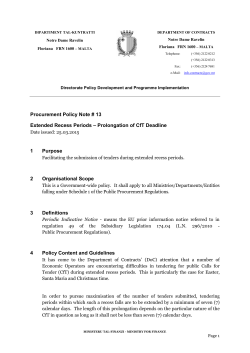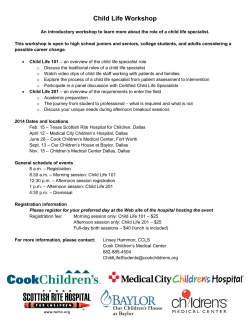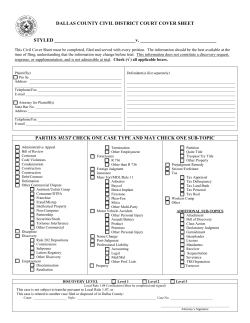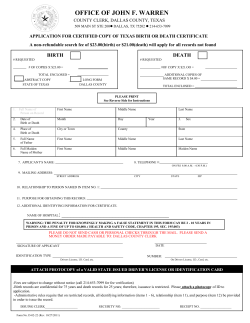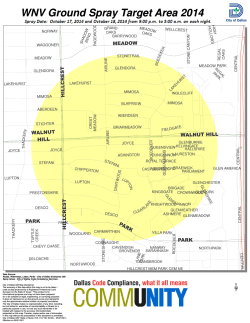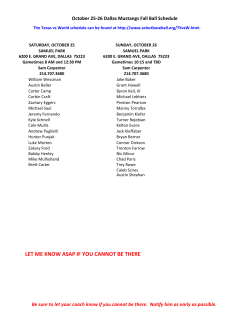
City Square Case Study - Asset Funders Network
CITYSQUARE: CASE STUDY IN TRANSFORMATION work of the Annie E. Casey Foundation. The model provides Background and advance economically. The revelation of a data-driven study released in 2012 was a Working Families Success cohort and provided technical wake-up call for area nonprofits, including CitySquare. assistance, training and coaching for agencies interested in Communities Foundation of Texas (CFT) and the Thomson moving toward this integrated service delivery model for Family Foundation engaged the Corporation for Enterprise their clients. a framework for delivering a “bundled” set of three core services with the goal of helping clients overcome barriers In 2014, CFT launched the Development (CFED) to complete the study, the Dallas Asset & Opportunity Profile. The study looked at Dallas and the CitySquare’s Participation North Texas Region and revealed that the region’s poverty CitySquare, formerly Central Dallas Ministries, participated level was higher than the national average. The profile in both D3 and the Working Families Success cohort. The showed that two out of every five households (39%) in Dal- nonprofit, which started as a food pantry in 1988, was in the las live in asset poverty, which means the households do not trenches of offering such social services as foster care and have sufficient assets available to last 90 days should they workforce development when the study was released. But lose their main source of income. In addition, almost half of data in the profile made it clear that the nonprofits were Dallas residents with a high school diploma are living at or losing the battle. Despite all that was being done, Dallas had below the Federal poverty level. This creates a problem the sobering distinction of ranking first among cities in Texas where many residents have too few resources — savings, with the largest number of children living in poverty. investments, credit, insurance — to fall back on in the event of a job loss. Financial insecurity destabilize families and By 2012, CitySquare had grown into one of the city’s leading jeopardizes the long-term stability of local economies. poverty-fighting agencies that also offered programming in Houston, San Antonio, Austin and Denver. Over the years, it Following the release of the profile, CFT laid out a plan to had expanded its services and even changed its name to convene and align social service agencies and foundations support its evolving identity. When CFT kicked off its initial around the issue of asset building. The plan included provid- D3 cohort, CitySquare was in the early planning stages for a ing training and capacity building to the organizations that new idea called the Opportunity Center. This project funded support low income working families with the goal of teach- in partnership with PepsiCo, was to create a single location ing them to use data to make informed programming decisions. The plan was administered through the Data Driven Cont’d on reverse side Decision-Making Institute, known among participants as D3. The institute was designed to empower social service organizations with the ability to accelerate the development of enhanced solutions for the social and economic problems facing their clients. The D3 Institute consisted of targeted learning opportunities for personnel at all levels of participating organizations, including leadership and program staff. Participants were selected through a competitive grant process and asked to make a 12-month commitment to program participation. Forty-six nonprofits have participated in D3 since 2012, and leaders of many of the organizations have called it a gamechanging experience. CFT also researched best practices across the country and found the Working Families Success model based on the CitySquare’s Opportunity Center (above) is a multi-service 52,000 square foot facility originally envisioned as a solution to overcrowding in the growing number of social services and community development programs. After participating in D3 and the Working Families Success cohort with CFT, CitySquare adopted the “quarterback approach” to create a center that uses data to develop comprehensive programs for clients. Cont’d from reverse side the Opportunity Center, they hope to expand it to other CitySquare locations and populations. that would include a food distribution center, a state of the art wellness center, a comprehensive employment training CitySquare developed a unique model for Dallas, but also center, AmeriCorps offices and staging areas for the non- now uses greater collaboration and data-driven decision- profit’s growing Food on the Move program, which is fund- making internally, because of the CFT cohort work, said John ed by the Texas Department of Agriculture. Siburt, CitySquare’s president and chief operations officer. The Opportunity Center was originally conceived as a “mall “We had grown so fast and had become siloed in our think- of nonprofits,” where local agencies could be co-located ing internally,” Siburt said. “We needed a vision and lan- together to support clients. But through its involvement in guage to drive us to the next level, and both D3 and Work- the D3, CitySquare began to see the Opportunity Center as a ing Families got us there.” way to deliver more integrated and connected services, based on data. CitySquare moved from seeing itself as a Lessons Learned landlord who merely houses nonprofits together to being The CFED report lit a fuse within CitySquare’s team, as well the quarterback of a team of service providers who help as the larger nonprofit community, that transformed peo- clients navigate an integrated system of economic services ple’s understanding of the economic challenges facing local and supports, mutually aligned around a shared vision. households. Additionally, the report triggered an interest in providers, such as CitySquare, to look at the services they “We needed a vision and language to drive us to the next level, and both D3 and Working Families got us there.” - John Siburt, President & Chief Operations Officer, CitySquare provided, and evaluate if those offerings were making the real and lasting impact that they were striving to help their neighbors achieve. The CitySquare team reflected on the key lessons learned so far: Co-creation was always important to the CitySquare ethos, but the Working Families Success model and intense technical assistance and support provided by CFT took the idea and made it tangible for the staff, especially through the financial coaching approach to Suzanne Smith, founder of Social Impact Architects and a D3 facilitator and coach, was assigned to work with CitySquare serving clients. Adoption of best practices allowed CitySquare to leap- as part of its participation in D3. Smith has worked with frog existing practices and dream bigger for its work. other communities, including Cincinnati which had estab- CFT, through its funding and support, brought in local lished a series of integrated service models through its Unit- and national experts who provided learning and best ed Way-led Place Matters Project. Smith and CFT staff ar- practices, which made the process more impactful and ranged for CitySquare to tour Cincinnati’s integrated service efficient for CitySquare and other participating agen- delivery locations as a way to demonstrate what could be possible for the Opportunity Center. cies. Data was always being collected at CitySquare, but now CitySquare leaders are intentional about their use of After participating in D3, CitySquare was eager to join CFT’s data and outcomes to evaluate programs and better Working Families Success cohort. While the organization understand how they can improve all internal and ex- philosophically supported the idea of co-creating with its ternal work. The expanded focus on outcomes through clients (whom the nonprofit calls neighbors), the Working the agency has created a reinforcing loop of continuous Families Success cohort helped CitySquare focus in on the improvement, transparency and shared language for seamless integration of services, and develop the full range staff at all levels. of services now provided at the Opportunity Center to support neighbors around the achievement of economic outcomes. Once the CitySquare team gets the model refined at
© Copyright 2025
